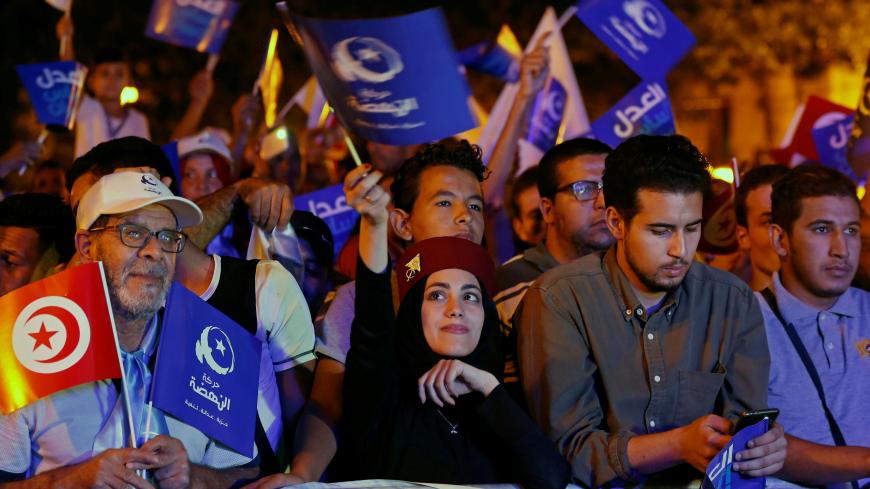TUNIS, Tunisia — Hager Barcous, a local official for the Ennahda movement in Nice, France, announced Jan. 15 that she would withdraw her membership from the movement. She argued that Ennahda’s decisions, discourses and activities no longer represent her. She also demanded serious internal structural reforms before she resumed her partisan activity with Ennahda.
Earlier, on Jan. 14, another Ennahda member, Ziad Boumakhla, resigned from the party in a post on his Facebook account, without stating the reasons. Boumakhla had been active with Ennahda for over 10 years.
On the same day, active Ennahda leader Hisham Laarayedh, who is also the son of the movement’s deputy head and former Prime Minister Ali Laarayedh, followed suit. He announced that he is quitting in a Facebook post. He had been an active member of Ennahda for a decade. He, also, did not reveal in his post the reasons for his resignation.
These resignations are not new for Ennahda. Zubair al-Shahoudi, who served as office director of Rachid Ghannouchi, the head of Ennahda, had resigned on Sept. 17, 2019. He urged Ghannouchi to retire from political work.
Ennahda parliament member and former Minister of Development, Investment and International Cooperation Ziyad al-Athari had renounced on Nov. 28, 2019, all leadership positions in the movement. He resigned from his post as the party’s acting general secretary and as a member of its executive office. He cited dissatisfaction with the movement's political line, its nomination of Habib Jemli to head the government.
These resignations, coinciding with the 11th Ennahda National Congress to be held on a date to be determined, stem from diverging positions on political options.
Jemli, nominated by Ennhada, failed to gain the confidence of parliament. Add to this the movement battled internal differences, most notably regarding the controversial amendment of its internal organization regulations so as to allow Ghannouchi to remain at the party helm. A large segment in Ennahda opposed the amendment.
For Ali Laarayedh, the resignation of his son and a number of the movement’s leaders is only normal in a movement that has dominated the political scene for nine years and is now witnessing an internal overhaul. “The party’s young members have gained [political] maturity and are seeking a higher post within the party,” he told Al-Monitor. “The party’s youths want quick change in relation to the formation of the government and the management of public affairs.”
He explained the recent resignations are a message to the movement’s supreme leaders that change and evaluation are necessary: “Ennahda is facing a very difficult situation. It is seeing its popularity dwindle in light of its weak choices and inclinations after the legislative and presidential elections.”
In an interview with Radio Mosaique on Jan. 15, chairman of Ennahda’s Shura Council Abdelkarim Harouni said the movement continues to hold dialogue with the young members to persuade them to renege on their resignations to preserve the unity of the movement.
Mohamed Baoud, a political analyst, told Al-Monitor these resignations are more like a rebellion inside the movement, which lost parliamentary seats — going from 89 in 2014 to 54 in the 2019 legislative elections.
Baoud said that Ennahda has begun to lose its grip on the political scene, especially after its failure to form a government on Jan.11, as a result of Ghannouchi’s wrong political choices and monopoly of decision.
“There is a clash between two movements in Ennahda. The youth camp [within the movement] is calling for leadership and administrative change within the party. The second is the group that has political legitimacy and won in the movement's 10th congress in May 2016 and is represented by the leadership of the movement, its executive office and official institutions,” Baoud said.
Ibrahim al-Omari, a professor of political science at the Center for Economic and Social Research in Tunisia, told Al-Monitor that the frequent resignations in Ennahda are linked to the unstable political situation in the country in general and to the movement’s disorganized policies given the differences in views.
These resignations within the movements have been ongoing since 2011. Omari said they were the results of two factors: the differences in political stances and clashes over the distribution of ministerial portfolios. The latter led to the resignation of Ziyad al-Adhari.
Ennahda has been the ruling party for nine years, and the internal differences have begun to emerge to the surface through these resignations and the harsh public criticism, which reflects a deep organizational problem that could lead to further dissidence and divisions within the movement.
For his part, Abdul Jabbar al-Madouri, editor-in-chief of Sawt Achaab newspaper, expected more resignations in the coming period and the deepening of division within the movement with the upcoming National Congress of the movement, which will witness fierce competition between the party’s leaders over Ghannouchi’s succession.
He explained that these resignations are a negative indication of the beginning of the collapse of Ennahda — a scenario similar to that of the Popular Front, Nidaa Tounes and the Congress for the Republic following Tunisia's 2011 Jasmine Revolution.
Moad Bennsir, a researcher in sociology, told Al-Monitor that the resignations of young members from Ennahda is only normal given the nature of the young generation to rebel against what is tradition, especially when it comes to partisan organization.
He explained that since the Jasmine Revolution, young Tunisians abandoned all socio-cultural legacies and established an independent position for themselves in the general political sphere.
Bennsir said some of the resignations are because of a loss of confidence in the movement’s leaders, and young Tunisians are calling more and more for an alternative to traditional political parties.






